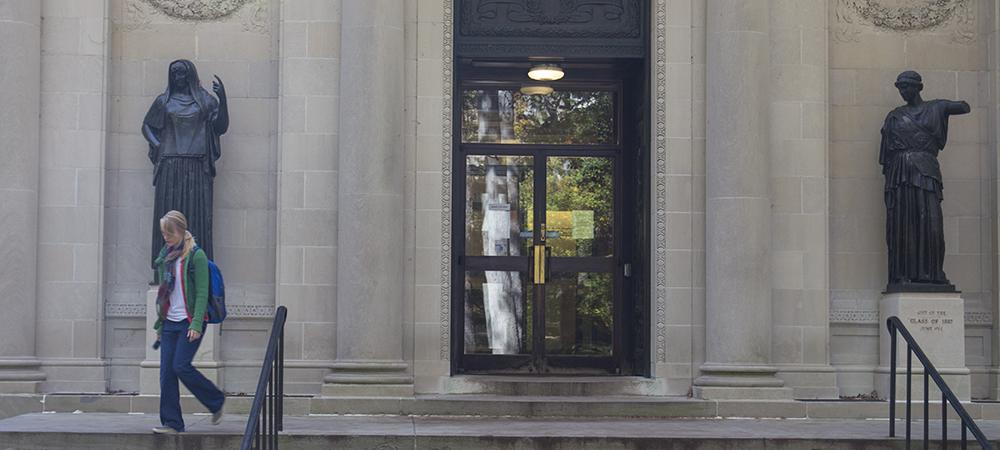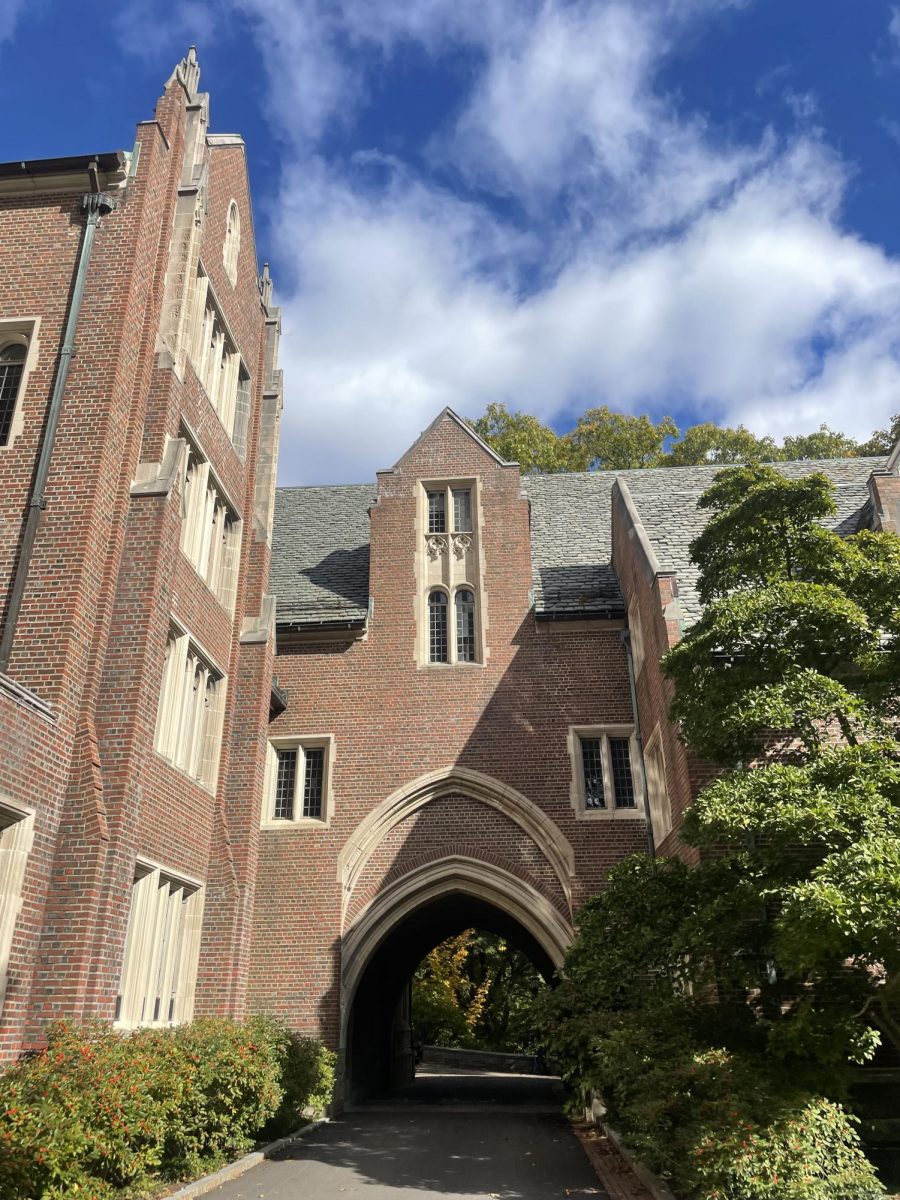Yesterday, Chair of the Committee on Curriculum and Academic Policy (CCAP) Ann Velenchik announced to the College via email that the health and society minor would be suspended indefinitely. The five-unit minor has been offered through the Women’s and Gender Studies (WGST) department since the 2014-2015 academic year. It is advertised as “a multidisciplinary field that examines human health as an eco-social phenomenon and draws principally from the humanities and social sciences,” according to the minor’s information webpage.
The email credited WGST Professors Emerita Susan Reverby and Charlene Galarneau for designing the minor, which requires students to take WGST 150 Health and Society and four electives across a number of disciplines, including anthropology, economics, sociology and more. This year, fewer than one-third of the courses listed that satisfy the minor are being offered, according to Velenchik’s memo. The memo notes that visiting faculty members were hired as “short-run stopgap measures,” but longer term plans for the department did not include a continued focus in the public health field.
The 2019-2020 academic year will be the last that WGST 150 and other health-related WGST courses are offered. Current students who have completed the course will be able to declare the minor until the end of the academic year.
In the early 2000s, Professors Reverby and Adrienne Asch, who taught at the College for just over a decade, began advising students who were interested in pursuing individual majors in public health and healthcare. Professor Galarneau joined the faculty in 2005, and along with Reverby, continued to advise students after Asch retired. In response to growing student interest, CCAP approached Reverby and Galarneau about instituting the minor in the 2012-2013 academic year, and it was formally offered for the first time the next academic year.
In any given year, approximately two dozen students are health and society minors. According to a 2017 report about the minor written by Galarneau, the program graduated 31 students in its first three years. There are currently 18 health and society minors at the College.
WGST Department Chair Rosanna Hertz defended the College’s decision to suspend the minor. “Deciding to let go of the health and society minor was the right decision to make,” Hertz stated. “It is not in the interest of the WGST department to continue to have an additional minor that lacks either sufficient course offerings or regular faculty whose teaching interests are in this area.”
Wellesley’s health and society minor is unique among liberal arts colleges, because it is housed in the WGST department, according to Galarneau. “I don’t think there’s been another school where that’s been true, though there has been interest in other schools in that,” she said.
The minor’s directors have recognized the challenges the program faces since at least 2017. “An ongoing challenge for the H&S minor is having a sufficient number of courses with intellectual breadth and depth,” stated the 2017 report.
Housing the minor in one department while utilizing courses from other departments has proved challenging for the program. “The health and society minor, unlike many other minors, is dependent upon courses across the curriculum. And every department makes decisions about what their priorities are. So this minor is at the mercy of many different departments’ decisions,” Galarneau said.
Current students have already been impacted by the limited nature of the minor. Despite their continued interest in public health, Cal Bullitt ’21 is dropping the minor after this year because of a lack of faculty support. “Because of the fragmented and undeveloped faculty group of the minor, there isn’t much support. I decided to drop the minor before the College did, so I have a great segue to tell my advisor that I’m dropping,” Bullitt said.
Others have expressed concerns that the methods of systemic analysis of health that they have accessed through the minor will no longer be made available to future Wellesley students. Mar Barrera ’20 credits the minor with “completely changing” their career path by encouraging them to move towards health advocacy for marginalized populations, particularly the transgender community.
“The very pragmatic aspects of WGST were helpful for me personally, as a trans person in this society. The classes offered under that minor and the emphasis on public health policy really were applicable. So I think it’s really sad that they’re stripping away that specific lens of the department,” Barrera said.
Ashley Wang ’20, who will be graduating with a health and society minor, said that it provided a valuable counterpoint to what is traditionally studied by students going into the medical field. “As someone who came into Wellesley on the pre-med track, the health and society minor provided an invaluable balance to the heavy STEM workload of the track,” she said.
Wang continued, “To me and many others, medicine and healing is not just labs and white coats but rather a whole world.”
Professor Galarneau was surprised when she received Velenchik’s memo. “When I left, I very much thought that there was a commitment to continuing [the health and society minor]. It is disappointing. I’m disappointed mostly for students. It was built for a set of solid reasons that are still there, but apparently there aren’t resources, or it isn’t a priority at this point,” she said.
The move appeared to contradict what Galarneau perceived about student interest of public health at Wellesley. “There’s ongoing interest, and even growing interest,” Galarneau said. She cited the WGST department’s historical curricular strength in health and healthcare as a motivating factor in creating the minor.
“I don’t know why it’s being dropped. [Velenchik’s] explanation is that faculty who did primary teaching in that area have left. And the College has been in an era of reducing the size of the faculty. But I can’t explain the prioritization of this — that’s a question for the administration,” Galarneau continued.
Reverby was not surprised about the College’s decision to suspend the minor, and points to the ongoing financial difficulties the College has faced in recent years. “Given the kinds of cutbacks that have been in the faculty, both because of the retirement program and also the financial needs of the College, there hasn’t been hiring. I knew when I retired that I wasn’t going to be replaced exactly,” she said.
The loss of the health and society minor comes in the wake of the Voluntary Retirement Program (VRP), a one-time retirement program that offered incentives to faculty and staff members over a set age and experience threshold. The VRP contributed to the administration’s efforts to achieve a sustainable operating budget.
In spring 2018, President Paula Johnson thanked the success of the VRP in “streamlining” operations and cutting costs. “In order to accomplish the needed reduction in the overall size of the faculty, the majority of tenure-track lines vacated as a result of the VRP will not be replaced,” Johnson stated in her email announcement.
As previously reported, faculty across all disciplines were worried about the curricular effects the VRP. Thirty-four faculty members across numerous departments took the package, including Galarneau.
“Those of us who were in that position back then, we had no idea what it would mean. We knew the College was looking to reduce faculty, but we didn’t know what that meant for any individual program, because no one knew how many people would actually take it,” Galarneau said.
Reverby retired just before the VRP announcement, but still acknowledges its role, and retirement in general, as a key factor in the suspension of the minor. “The problem with the buyout is that it’s not purposeful because it’s up to people’s personal decisions, so one department could lose large numbers of people just on the age gradient. The College has to make hard decisions all the time about whose needs can they address,” she said.
Despite the loss of the minor, students will still be able to incorporate courses related to public health into their studies. “All the intro courses talk about women’s health among the many other topics they cover. So students who want to know more about these topics will still find them in our courses and in courses in other departments in the College,” explained Hertz.
The degree to which students will be able to pursue those interests is unclear. As Reverby notes, students may need to pursue an independent major in the topics, just as students did prior to the establishment of the minor. “The memo doesn’t address the issue of whether or not students will be able to pull together enough courses to make a coherent major in health and society,” she said.
Velenchik’s memo also notes that CCAP would consider alternative designs and departmental homes for a program derived from the health and society minor.
The founders of the minor take hope in the continued interest across the student body. “There’s a lot of ways in a student’s curriculum to explore her interest in this area. I just want to encourage students to not feel completely discouraged by this,” said Reverby.
“Disappointing as this suspension is, it’s heartening that it’s not a closure. I take hope in that,” explained Galarneau.






